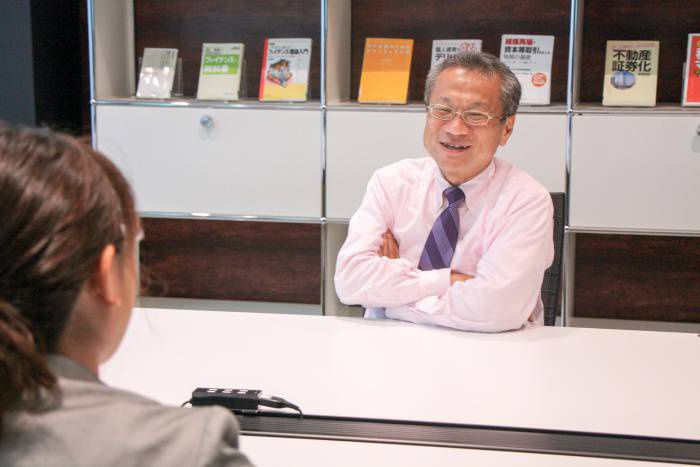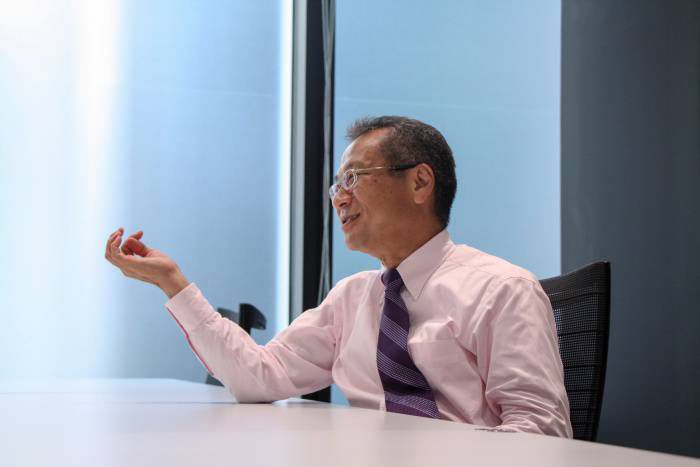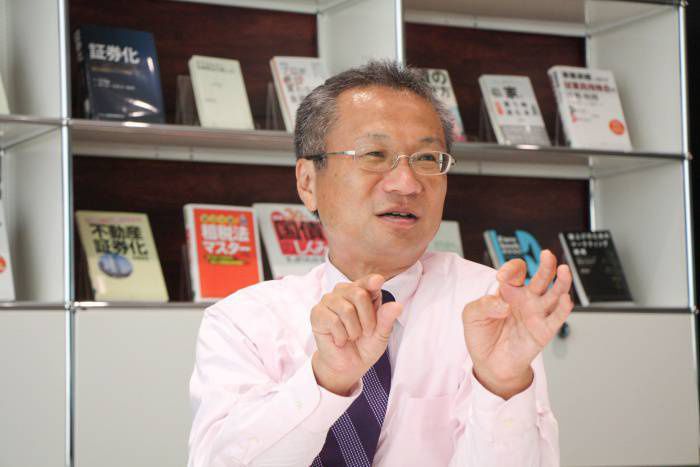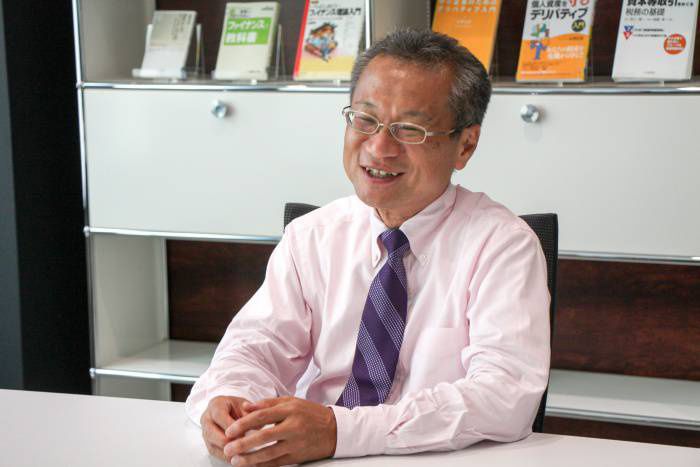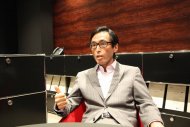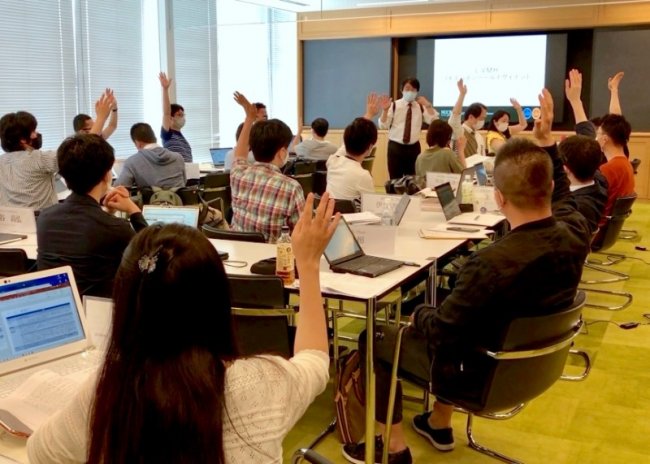Dr. Yuji Nagasawa, Professor, Graduate School of Management
Dr. Yuji Nagasawa started his career at Nissho Iwai and then at Softbank, where he served as the right-hand man to Mr. Masayoshi Son. He has also served as the president of many venture companies and has a wealth of practical experience. We interviewed him about his career. Regarding his "attitude toward lectures" and "Strategic Thinking," the subject he teaches, Professor Nagasawa said, "For me, the MBA classroom is a theater. The moment you raise your hand, there is a breeze."
Interviewed: August 2015
Interviewed by: NUCB Business School Public Relations
How I got my MBA and Harvard.
Please tell us about your career.
After working for Nissho Iwai (now Sojitz) for 22 years, I moved on to venture companies. The first half of my career was at a large corporation and the second half at a venture company. I served as president or CEO of six companies, of which five were start-ups. In my first company, Nissho Iwai, I was a programmer in the Information Systems Department. After working there for 10 years, I decided to quit and told them I was leaving, but the director told me not to. He told me that he knew the president of my next company very well and called him on the spot and said, "Nagasawa is here, but I will never let him go to your company." I couldn't quit. The director had a lot of things on his mind and said, "You can't go back to the field, so go for an MBA." I had no intention of going for an MBA, and when I tried to quit the company, I was given the opportunity. It was a kind of "gonegake" (laughs).
Were you able to go as soon as you were qualified?
I was qualified to go to the MBA program, but of course I had to take the exam and be accepted or they would not let me go. I had to study very hard because the school had to be one of the top ten business schools in the U.S. or they would not pay my tuition. I was not good at English, so I attended an MBA prep school for about half a year. Since I was not good at English, I attended an MBA prep school for about six months. One of my teachers at the prep school even told me, "It is encouraging for younger students to know that someone like Mr. Nagasawa, who scored poorly, can be accepted." I was 34 years old and had two children, but I was given a chance and was determined to study hard, so I left my family in Japan and went to the United States.
I learned so much that I never want to go back there again.
Tell us about your episode at Harvard.
At Harvard, I lived in a dormitory and studied relentlessly. Even if I were asked to go back, I would not want to go back again. What was tough was the evaluation system. At the UCB Business School, there is an ABCDF evaluation system, and DF students do not receive any credits. Harvard is the same, but what makes it even tougher is that all courses are required in the first year. In other words, if you don't get all the credits, you will be expelled from school. There is no retention or long-term course system. Perhaps because of this pressure, everyone was studying hard, and I had no choice but to study hard .s well/
At Harvard, there are 80 students in a class, but everyone raises their hands in the lecture, so it is difficult to speak even if you want to. I didn't speak for about a month after the lecture started. One day, when I raised my hand, everyone else put theirs down and I was the only one with my hand up. They cheered, "Eugene, Eugene, Eugene." I was so moved that I cried. School is about competition, but it's also about working together. It was an opportunity to compete, but also to work together.
![]()
My MBA changed my life.
What kind of work did you do after getting your MBA?
Although my grades were not good, I managed to graduate from Harvard and when I returned to Japan, the company assigned me to the Corporate Planning Department, a department where I could utilize my MBA. I was asked to create a strategy for the information and communications field, which was growing at the time, and I had to launch a venture as one of the pillars of the business, but the company said, "We don't have anyone who can do it, so Nagasawa, you do it. This has always been the case. In the end, I did what I said I would do. After 17 years with the company, when I was about 40 years old, I was entrusted with the role of sales section chief, and for the first time I was able to do what I wanted to do as a member of society.
I started two companies, a network game company and a database software company, and I also served as the president of both companies, and although they were small companies with 10 to 20 employees, I enjoyed them very much. However, things did not go well. Venture investment is risky, so if you build 10 companies, you only need one to succeed, and even if nine fail, you can make it up with the one that succeeds. When I was put in charge of a company, I told the company not to interfere too much with the failure of the company because of the high risk, but after all, if a company failed, a batten would be put on my evaluation. To put it bluntly, it was becoming as if Nagasawa could not be trusted and should not be allowed to work.
![]()
Mr. Son is the best manager and my mentor.
What did you do after the project failed?
That's when I remembered Mr. Masayoshi Son, whom I had a chance to meet when I launched two companies and he asked me to come to his company. I was at a standstill, so I went to see Mr. Son to ask him for help. Luckily, he remembered me and said, "Come to my house. However, I was quite cocky at that time, so I made a condition to Mr. Sun. He asked me to make him the president. Of course, I didn't mean that he should make me the president of Softbank. So I joined Softbank, but I was only there for one year. During that time, I launched Carpoint (now Car View), an automobile sales brokerage company jointly established by Softbank and Microsoft in Japan, and one other company. Mr. Son said that he would hire people, but he actually hired two new employees. It may sound a little rough, but we managed to do it.
Mr. Son is the best manager I have ever met in my life. He is successful and I hope he will be even more so. I have learned a lot from him, and he has influenced me so much that I am copying his way of speaking and presentation. Mr. Sun is four years younger than me, but regardless of his age, I respect him the most.
The Last Job of My Business Life
Have you done anything other than startups?
After getting my MBA, I was all about venture businesses, so I decided to cool down a bit and joined a foreign company, PricewaterhouseCoopers. I thought consulting was interesting, but I gradually began to wonder if consulting companies tended to become money-making and if they were really advising their clients. As I talked about these contradictions with my subordinates, we hit it off and I started my own company again.
I worked there for about three and a half years, and my work was going well, but before I knew it, I was 50 years old. When I thought about what I wanted to do when I reached the age of 60 or 65, which is the retirement age for most companies, I realized that I wanted to be the president of a venture company again at the age of 60. I wanted to be the president of an actual business, not a consulting company.
How did you become a teacher?
I had grown up in Ryebridge, so I left it to my junior colleagues, and through an acquaintance, I became the president of Tech Index, a company of about 250 people. What should I do next, start my own business and become president or retire and live a comfortable life? While I was wandering around for a while, a junior colleague at Harvard asked me if I would be interested in teaching at a business school. I was involved in the founding of the business school and was in charge of the first strategy class there. After lecturing there for about a year, I was fortunate enough to join the faculty of the Business School at Nagoya University of Commerce and Business.
As a teacher, what do you want to tell your students?
I stand in the classroom to share my life experiences, both the fun and the painful ones, with everyone. In a way, that's really cool, because it's the last thing I'll ever do in my business life. If I were to stay in one company, it would be passed down from generation to generation. When I became a boss, I would try to do for the younger people what my bosses did for me when I was younger, and I think that's true in any company.
So, how can I give back to the person who sent me to Harvard? What I can do is to do what the director did for me, and if I can do the same for someone else, although I am not in the same company, I think that would be a way of giving back. If I can give something back, I will be very satisfied.
I have learned a lot from the people who have helped me when I was going through really tough times in my life. So, I would like to somehow pass this on to my juniors, and as a junior in life, I have a strong desire to pass this on to students. In that sense, I think of my work as the last job of my life, so I always give it my all.

 Brochure
Brochure
 Info Session
Info Session
 Application
Application
 Alumni Voices
Alumni Voices




